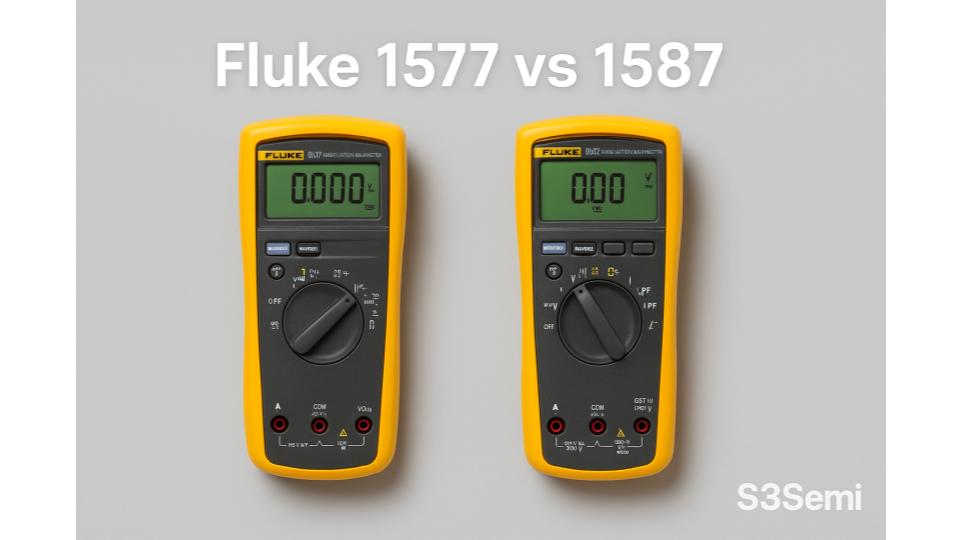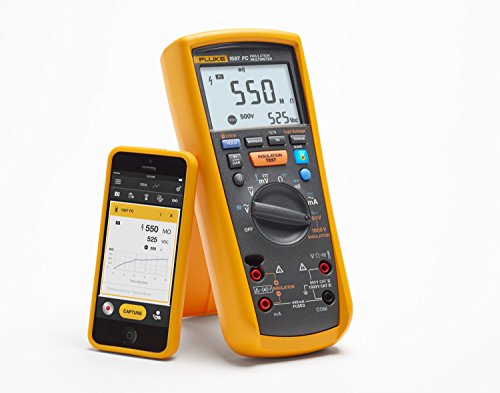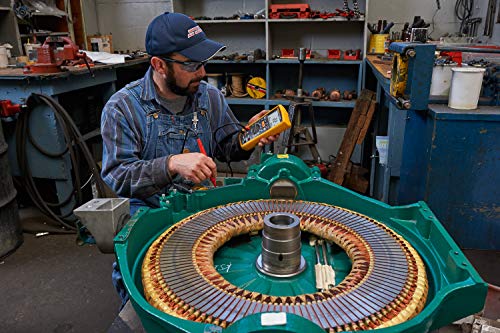When it comes to insulation testing, the Fluke 1577 and Fluke 1587 are two of the most widely used models. Both are insulation multimeters, meaning they combine the features of a digital multimeter (DMM) with an insulation resistance tester.
🏷️ Fluke Insulation Tester Deals ⭐⭐⭐⭐
However, there are key differences in functionality and accuracy that make them suited to slightly different applications.
📋 Overview of the Fluke 1577
The Fluke 1577 is a straightforward insulation multimeter designed for professionals who need reliability without too many extras. It provides solid insulation testing and basic DMM functions.
Key Features:
- Test voltages: 500 V and 1000 V.
- Insulation resistance up to 600 MΩ.
- Measures AC/DC voltage, resistance, and continuity.
- CAT IV 600V / CAT III 1000V safety rated.
- Rugged design for field environments.
Best For: Electricians and maintenance professionals who primarily need a basic insulation tester with added multimeter functions.
⚡ Overview of the Fluke 1587
The Fluke 1587 expands on the 1577 by offering more test voltages, higher insulation resistance range, and advanced features.
Key Features:
- Test voltages: 50 V, 100 V, 250 V, 500 V, and 1000 V.
- Insulation resistance up to 2 GΩ.
- Full DMM functions: AC/DC voltage, resistance, continuity, frequency, capacitance, and current.
- True-RMS accuracy for AC loads.
- Polarization Index (PI) and Dielectric Absorption Ratio (DAR) testing.
- Backlit display for low-light conditions.
Best For: Professionals who need advanced insulation testing and complete multimeter functionality in one tool.
⚖️ Fluke 1577 vs 1587: Side-by-Side
| Feature | Fluke 1577 | Fluke 1587 |
|---|---|---|
| Insulation Test Voltages | 500 V, 1000 V | 50 V – 1000 V |
| Max Insulation Resistance | 600 MΩ | 2 GΩ |
| Multimeter Functions | Basic (V, Ω, continuity) | Full (V, Ω, continuity, capacitance, frequency, current) |
| 💳 Pricing | 💲Check Price | 💲Check Price |
| True-RMS | ❌ No | ✅ Yes |
| PI/DAR Testing | ❌ No | ✅ Yes |
| Backlight Display | ❌ No | ✅ Yes |
| Safety Rating | CAT IV 600V / CAT III 1000V | CAT IV 600V / CAT III 1000V |
| Best For | Basic insulation + multimeter tasks | Advanced insulation + full DMM tasks |
✅ Pros and Cons
Fluke 1577
✔ Simple and reliable design
✔ CAT IV safety rating
✔ More affordable than 1587
✘ Limited test voltages (only 500 V & 1000 V)
✘ No advanced multimeter functions
Fluke 1587
✔ Wider range of test voltages (50–1000 V)
✔ Higher insulation resistance measurement (2 GΩ)
✔ Includes PI and DAR testing
✔ Full DMM with True-RMS
✘ Higher cost
✘ Slightly bulkier
📝 Which One Should You Choose?
- Choose the Fluke 1577 if you need a rugged, affordable insulation multimeter for everyday electrical maintenance and don’t require advanced features.
- Choose the Fluke 1587 if you want a versatile all-in-one tool with advanced insulation resistance testing, higher accuracy, and full multimeter functions.
In short, the 1577 is the practical workhorse, while the 1587 is the advanced multitool for technicians who need more precision and flexibility.




